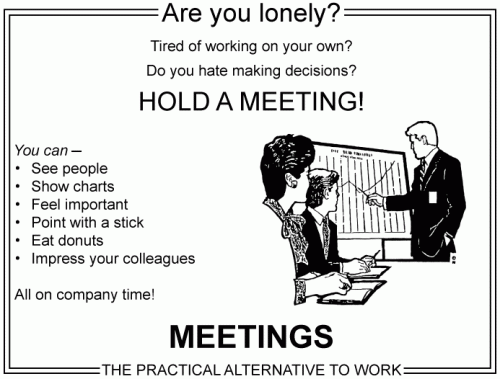Now, there are different kinds of meetings. Big, scheduled meetings tend to be a waste of time. If you have ten people sitting around a table for an hour, that adds up to ten hours. They also tend to produce the appearance of agreement. It's only when you get to working that disagreements arise. Finally, there's always someone who cannot stop themselves from talking (this is called logorrhea).
So, I try to have smaller, impromptu meetings. The problem with these is that they can lead to a lot of interruptions, which can be just as bad as big meetings. In theory, a larger meeting can get all your interruptions out of the way at one time. But, as we've seen, it doesn't always work that way.
They guys at 37 signals have a few suggestions:
- Set a 30 minute timer. When it rings, meeting's over. Period.
- Invite as few people as possible.
- Never have a meeting without a clear agenda.
- Begin with a specific problem.
- Meet at the site of the problem.
- End with a solution and someone responsible for implementing it.
So what can you do?
First, don't waste your time in meetings you have no interest in attending or ability to contribute to. I go to meetings late and leave early all the time. This is responsible behavior. There are simply better uses of my time. Just say, "Are there any other questions for me? No? Let me know if anything comes up."
Second, prepare for meetings, even if you're not leading them. I often write an email to meeting participants ahead of time with a list of questions or things to talk about. You don't have to stick to it, but it helps guide the conversation. And, if anyone reads the email, they can respond to your questions and move the meeting along. Just say, "How about we start with my list of questions?"
Finally, write on the board, or a piece of paper if it's a small group. It is so easy to get lost in abstract concepts and systems that everybody needs to see the same thing. Stand up and play teacher. This is not your big chance to explain everything to everyone. Instead, you should be a conduit for everyone else. In my experience, good teachers help students connect their own ideas rather than impose a solution. Just say, "Let's get this on the board. What is the first step?"


No comments:
Post a Comment